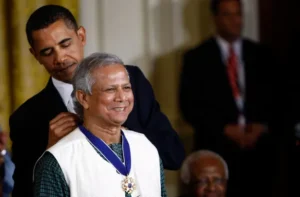By Kamran Reza Chowdhury on Jan 01, 2024 Benar News
A court in Bangladesh on Monday sentenced Nobel laureate Muhammad Yunus to six months in prison for violating labor laws, the first conviction of the 83-year-old microcredit pioneer who faces a slew of criminal and civil cases that his supporters say are politically motivated.
Yunus was convicted and sentenced along with three other senior managers of Grameen Telecom, a non-profit company he founded in 1995 to promote phone service in rural areas as a means of combating poverty.
“I have been punished for an offense I have not committed. It was written in my destiny, and that of the nation; I have to bear it,” Yunus told journalists as he left the courthouse.
Judge Sheikh Merina Sultana granted all four defendants a one-month bail, and Yunus’ lawyer declared his intention to appeal the verdict.
Chief Prosecutor Khurshid Alam Khan told BenarNews his team had proven “beyond doubt” that Grameen Telecom failed to make employees permanent, provide them a share of profits and set aside welfare funds, as mandated by labor laws. The case was filed in September 2021, and indictments followed in June 2023.
Abdullah Al Mamun, Yunus’ defense lawyer, called the verdict “unprecedented,” especially in how quickly it unfolded.
“The case flew like a supersonic plane. The purpose of such fast disposal is to convict Dr. Yunus. This case is completely politically motivated,” Mamun told BenarNews.
“Grameen Telecom is registered as a not-for-profit company under section 28 of the Company Act-1994. There is no provision of taking profit from the company. The profits are used for the welfare of the people,” Mamun said, adding: “Employees enjoy salaries and all service benefits.”
He argued that the case should have been tried in civil court. But lead prosecutor Khan told BenarNews: “The High Court has given its opinion that a criminal suit can be filed in this case.”
Grameen Telecom is a sister concern of Grameenphone, Bangladesh’s biggest phone service provider that revolutionized the country’s telecom sector with support from Norwegian company Telenor. The company says its revenues are used for community development.
“I just call it a travesty of justice. It is a travesty of justice,” Irene Khan, former secretary-general of Amnesty International, who was at court Monday, told BenarNews about the verdict.
“In this country, there are so many crimes being committed everyday against the workers, labor unionists have been killed, factory workers who were protesting were attacked. No action is taken by the government,” she said.
“The Nobel Peace laureate who has brought great honor to this country, who has campaigned and advanced against poverty, is being persecuted under the guise of prosecution,” she said.
‘Judicial harassment’
In August 2023, more than 100 Nobel laureates signed an open letter to Bangladeshi Prime Minister Sheikh Hasina, urging her to end what the letter described as “continuous judicial harassment” of Yunus.
Yunus gained global renown as a pioneer of small loans for borrowers generally shunned by banks. When his Grameen Bank won the Nobel Peace Prize in 2006, it had granted loans to more than seven million borrowers, with an average loan amount of US$100 and very high repayment rates, according to the Nobel Foundation.
Two years later, Bangladesh’s central bank removed Yunus from his position as head of Grameen Bank over a retirement age-related issue.
Yunus reportedly first came to the attention of Hasina’s Awami League when he formed a political party named ‘Nagarik Shokti,’ or Citizens’ Power, in 2007-2008, at a time of political turmoil due to a state of emergency imposed in the country.
At that time, Hasina, and her main rival, former PM Khaleda Zia, had been arrested in various corruption cases. But Hasina won the national election, returning to power in 2009. All the cases against Hasina were dismissed. She has been prime minister ever since and is expected to be re-elected for a fourth consecutive term in the upcoming Jan. 7 election.
Responding to the letter from global figures in August 2023, Hasina called on its signatories to send international experts and lawyers to scrutinize the accusations against Yunus.
“For those who have signed the statement, I suggest they send specialists and lawyers to examine the evidence and documents related to the charges against the accused,” the prime minister said. “I don’t know how issuing statements would lead to the dropping of charges. They should visit and see if there are any anomalies or inconsistencies with the process.”

